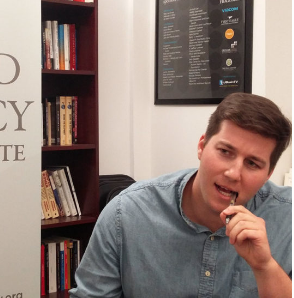
This summer, Jakob Weitz ’17 worked as an editorial assistant at the World Policy Journal, the flagship publication of the World Policy Institute (WPI). The position was one of two summer internships for LMU students offered through WPI@LMU, Loyola Marymount University’s partnership with the New York-based think tank. Weitz studies political science and journalism at LMU.
This summer, I had the opportunity to work for the World Policy Journal in New York City. As an intern there, I had four main responsibilities:
- I was the Arts Policy writer – in charge of updating a weekly web vertical that covers political art in New York and the politics of art around the world.
- I was part of team charged with researching and designing an infographic for the “Map Room” section of the next print issue of the Journal. My team and I designed and researched a map showing the fraught economic and political history and lineage between the UK and India.
- I edited and prepped some of the many articles we publish on our website every week.
- Lastly, I wielded the WPJ’s Twitter and Facebook account to promote and publicize our articles.
My main responsibility – and the one that taught me the most – was the Arts Policy vertical. I was given a blank slate and eleven weeks to fill. Although it seemed daunting, I was excited for the challenge. I had to find article ideas, pitch them to my editors, seek out artists, directors, and professionals for interviews, talk to Public Relations teams to get press passes, venture out of the office across all the boroughs of New York, then finally sit down and actually write the article.
My first assignment took me to the Brooklyn Film Festival, where I had set up an interview with the director of the film “China’s 3Dreams” that was screening there. I had only minimal experience interviewing people before this internship, but I realized that I was going to have to learn quickly. We met on a rooftop of the hotel where the film was being screened, and in that thirty minute interview, I learned more about interviewing than I had in all my years before.
I took that knowledge to my second interview, which was with a Turkish photographer who had been living in Egypt during the revolution. She was in Tahrir Square the night the riots broke out – she told me the story as we flipped through her new book of photos that I was covering. It was so unbelievably cool to be able to sit down and talk to someone who had lived through what she had – someone who was in the tangible air of history being made. Interviewing her, I was exposed to a depth of personal history – history of the living, breathing sort – that gives one such a deeper understanding of a historical event. I felt incredibly lucky.
This internship taught me how to be a journalist. Instead of interviewing professors and students, I found myself across the table from directors, published photographers, counter-terrorism investigators, artists. Instead of writing something for a grade, I found myself writing things for an editor, who would edit my draft, send it around the office, and then back to me to change. Although of course I had edited my own work before, it was a new experience working directly with a team of professional editors who shaped my articles.
My time at the Journal also enhanced many administrative skills that are an important foundation to any career. Things like setting and sticking to a schedule, having bosses and hard deadlines, email etiquette, timed publication schedules, setting up tracked calendars and Excel graphs, reaching out to people. All these are extremely valuable workplace skills that the average college student has trouble practicing before entering the workforce.
This was an experience I wouldn’t trade, and would recommend to anyone interested in journalism or politics. It showed me what it was like to work – really work – for a living, breathing publication making its way in the digital age. I want to thank Loyola Marymount University and the Institute for Leadership Studies for granting me this incredible opportunity.